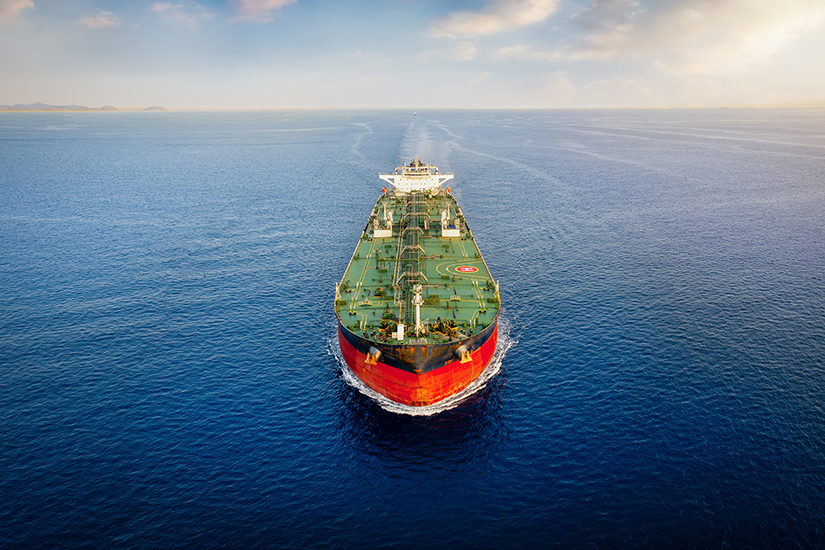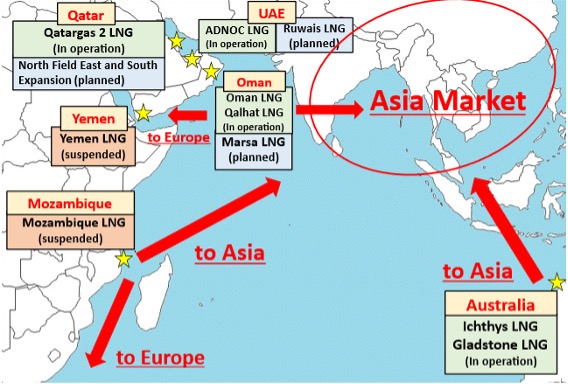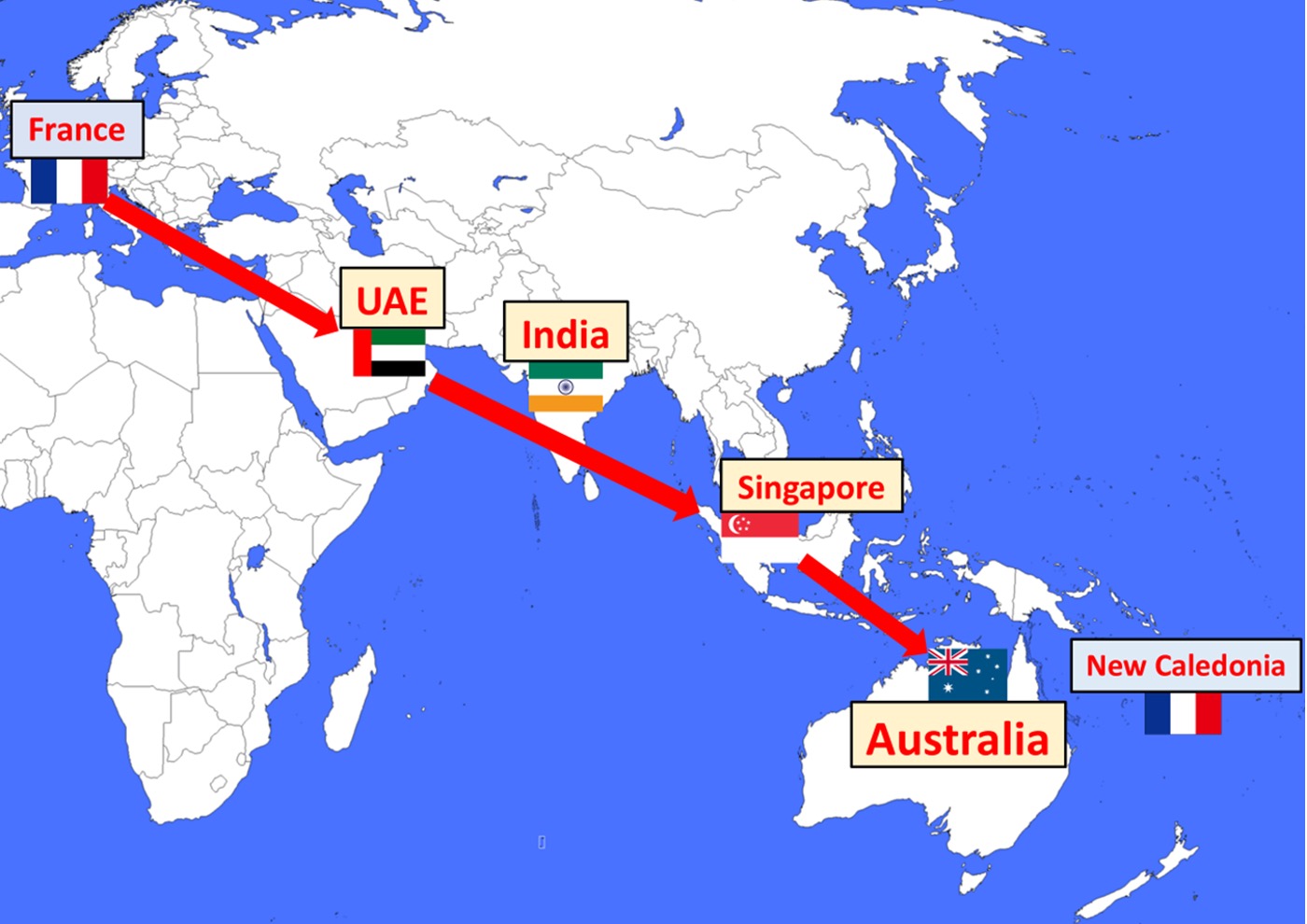Introduction
With Japan advocating the concept of a "Free and Open Indo-Pacific" (FOIP) in 2016 and global attention on the region growing, France has also taken a keen interest in the area. France, which has overseas territories in the Indian and Pacific Oceans, is increasing its involvement in the Indo-Pacific, centering on cooperation with India and Australia, while expanding the number of countries it partners with. In recent years, France has treated the United Arab Emirates (UAE) as a partner country and launched the France-India-UAE trilateral cooperation initiative in February 2023.
For France, the defense of its overseas territories in the Indo-Pacific is not only necessary to protect its sovereignty and the security of its residents, but also to protect its energy interests and resource diplomacy, as New Caledonia has important resource mineral deposits. Key to achieving France's comprehensive Indo-Pacific strategy is cooperation with the UAE, which is located between mainland France and India/Australia, and which serves as an important staging post for military operations. This paper examines the geopolitical reasons for France's pursuit of an Indo-Pacific strategy, including those from an energy and resource diplomacy perspective.

France's Indo-Pacific Strategy and its Overseas Territories
France was the first among European countries to embrace the idea of the "Indo-Pacific," with the country's Ministry for Europe and Foreign Affairs and Ministry of Armed Forces each developing an Indo-Pacific strategy in 2018-2019[1]. The Indo-Pacific Ocean, which stretches from eastern Africa to Oceania, is home to French overseas departments and regions (including Réunion and Mayotte) and overseas communities and collectivities (including New Caledonia and French Polynesia), with approximately 1.68 million inhabitants as of 2022[2]. As these overseas territories make up a large proportion of France's Exclusive Economic Zone (EEZ), the second largest in the world, France has some 7,000 military personnel regularly posted in the Indo-Pacific to defend them. It has been noted[3] that the growing influence of China has been behind France's focus on its Indo-Pacific strategy in recent years. As China's presence has grown, with the opening of a Chinese military base in Djibouti in 2017 among other developments, concern has grown in France that the rise of China is a destabilizing factor giving rise to serious security concerns.
Of the French overseas territories, New Caledonia in the South Pacific is of particular importance. This is because these territories contain deposits of the important minerals nickel and cobalt. Regarding the development of resources in New Caledonia, in May 2024, the independence faction [4] opposed a constitutional amendment in the French metropole granting local suffrage to long-term French residents, resulting in massive riots that destabilized resource extraction and transportation, and sharply reduced mineral production in 2024. Nickel production halved to 110,000 tons from 231,000 tons of the previous year, and cobalt production dropped [5] to 1500 tons from 2570 tons. Being able to produce a certain amount of minerals important for solar and wind power generation and electric vehicle (EV) products on French territory carries significance. Further support from the French government is needed to stabilize the political and security situation in New Caledonia.
France's Energy Interests
Involvement in the Indo-Pacific is also very important for France, including from an energy perspective. This is because France imports oil and natural gas from Middle Eastern countries through shipping routes from the Indian Ocean and also holds energy interests in Indo-Pacific countries.
To begin with, France's energy imports from Middle Eastern countries are on the rise in the wake of the Ukraine War started in 2022. Imports of Middle Eastern crude increased from 5.00 million tons (14% of total imports) before the war started (2021) to 7.80 million tons (17%) in 2023 [6]. During the same period, Qatari liquefied natural gas (LNG) imports also increased from 520,000 tons to 1.65 million tons [7]. France had been concerned about energy supply disruptions due to the repeated conflicts in the Middle East since the 1970s, and had diversified its procurement sources by bypassing the Strait of Hormuz, increasing imports from Russia, Kazakhstan, and other countries. However, with the war in Ukraine, France, in accordance with the European Union's sanctions against Russia, began to refrain from buying Russian fossil fuels and moved to alternative sources from Middle Eastern countries. In addition to suspending crude oil imports from Russia in 2023, the country is also attempting to restrict imports of Russian LNG. In this regard, there is an increasing need to stabilize the situation in the Middle East and to ensure freedom of navigation in the Indian Ocean.
On top of this, the French energy company TotalEnergies is working on resource development projects in the wider Indo-Pacific region. It should be noted that oil and natural gas produced from resource projects in which the company is involved are not necessarily exported to France. For example, LNG operations in Australia, Oman, Qatar, and the UAE, where the company holds natural gas interests in the Indo-Pacific, are mainly exported to Asian markets (Figure 1). The company earns revenue from trading LNG around the world and traded 44 million tons (11% of global share) of LNG in 2023, making it the world's third largest LNG operator [8].
With more than 100,000 employees, TotalEnergies is one of the largest companies in France, contributing significantly to economic growth and job creation in the country. In light of this, support from the French government is essential for the company's continued operations in the Indo-Pacific and the stable marine transportation of oil and natural gas from its resource development operations to Asian countries. As long as the energy projects in which the company has a stake exist, France will remain involved in the Indo-Pacific.
Figure 1: LNG projects in the Indo-Pacific in which TotalEnergies has an equity stake

Cooperation with India and Australia
France has been working with India in the Indian Ocean and Australia in the Pacific to maintain regional order in the Indo-Pacific in response to China's maritime expansion. To begin with, regarding relations with India, France was the first country with which India entered into a strategic partnership (January 1998). Even when India conducted a nuclear test at Pokhran in Rajasthan in May of the same year, coming under criticism from the international community, France opposed sanctions against India and insisted that dialogue with India was important in order to integrate India into the international nuclear nonproliferation regime. France's stance made India perceive France as a reliable partner, and has allowed [10] the two countries to deepen their bilateral relationship.
The French military industry has also long supported the procurement of fighter jets by India. India successively purchased 71 Ouragan fighters from France in 1953, 110 Mystère IV fighters in 1957, and 46 Mirage 2000H fighters and 13 Mirage 2000TH fighters in 1982 [11]. In 2016, India also agreed to purchase 36 Rafale fighter jets. More recently, on April 28, 2025, it also signed a contract [12] to purchase 26 Rafale fighter jets for its navy.
Based on these good bilateral relations, France and India signed the "Joint Strategic Vision of India-France Cooperation in the Indian Ocean Region" in March 2018 [13] to promote military cooperation in the Indian Ocean. Varuna, a maritime exercise that has been conducted in the Western Indian Ocean since 1998, was expanded in May 2018[14] to include the area around French Réunion. A logistics support agreement signed that same year also allowed the Indian Navy to use a French base in the French overseas territory (Réunion) in the Indian Ocean [15].
Next, in terms of relations with Australia, France concluded the "Joint Statement on Disaster Relief Cooperation in the South Pacific (the FRANZ arrangement between France, Australia, and New Zealand)" in 1992, and has strengthened cooperation in responding to natural disasters. The two countries issued a "Joint Statement of Strategic Partnership" in January 2012, and Australia is France’s sole security partner in the South Pacific[16], with the two countries, for example, conducting naval exercises as part of their military cooperation.
France has developed its bilateral relations with India and Australia into a trilateral cooperation framework of France, India, and Australia. In September 2020, the three countries held their first Foreign Secretaries’ Dialogue, and in April 2021, the three countries held Foreign Minister-level talks, as well as a parallel Track 1.5 Dialogue [17] involving experts and government officials from the three countries.
France-India-UAE Trilateral Cooperation
Trilateral cooperation between France, India, and Australia, however, has failed to make significant progress, due to the deterioration of France-Australia relations. The deterioration began with Australia's part in the creation of the “AUKUS” security partnership with the U.S. and U.K. in September 2021, and the unilateral cancellation of the contract signed with France in 2016 to develop next-generation submarines. France reacted furiously and decided to review its relations with Australia.
French-Australian relations have since improved, however, in terms of trilateral cooperation, France has looked to the UAE as a new partner country in its Indo-Pacific strategy. France, India, and the UAE held Foreign Affairs Ministerial level talks in September 2022, and a joint statement was issued in February 2023 on a Trilateral Cooperation Initiative[18]. Under the initiative, the three countries conducted their first joint maritime exercise in the Gulf of Oman [19] in June of that year and their first joint air exercise in the Arabian Sea [20] in January 2024. While French-Indian-Australian cooperation has focused more on the Pacific area, the French-Indian-UAE partnership emphasizes the Indian Ocean which is at the intersection of the three continents of Asia, Africa, and Europe.
The Importance of the UAE to France
Relations between France and the UAE have been consistently good since the establishment of diplomatic relations in 1974, and the two countries signed a defense agreement in 1995. The defense agreement, which was renewed in 2009, reportedly included a secret clause allowing France to use any military means to support the UAE [21]. In other words, the agreement envisaged the use of nuclear weapons by France as an option. In this regard, one could argue that France has extended its own nuclear deterrent to the UAE (although this point has never been confirmed by the two governments[22]).
French-UAE military cooperation is distinguished by the presence of French military bases in the UAE. Based on an intergovernmental agreement signed in January 2008, a French military base was established in the Emirate of Abu Dhabi, UAE in May 2009. The base is France's fifth permanent base overseas and the first outside of its former colonies. The construction of the base was requested by the UAE, with the UAE bearing all construction costs and France bearing the operating costs. The base is divided into three locations: the naval base's Mina Zayed port on the Persian Gulf side has a 300-meter wharf and can accommodate the French fleet including a French nuclear-powered aircraft carrier, while the port of Fujairah on the Gulf of Oman side can accommodate attack nuclear submarines. The army base of Zayed Military City has a training center for urban and desert combat which houses the 5th Cuirassier Regiment. Rafale fighters are stationed at the Al-Dhafra Air Base and the Escadron de Chasse 1/7 "Provence" has been stationed there [23] together with the U.A.E. Air Force and U.S. forces since 2016.
The Joint Commander of the French Forces stationed in the United Arab Emirates, where approximately 700 soldiers are currently deployed, will also serve as the Joint Commander of the French Forces deployed in the Indian Ocean (ALINDIEN). As such, French forces stationed in the UAE will be responsible for carrying out France's defense policy in the waters from the southern side of the Suez Canal in the west to Indonesia and the western edge of Australia in the east. In this regard, France's military presence in the UAE will not only protect TotalEnergies' energy interests around the Persian Gulf, but will also enable it to establish a rapid response system to defend French overseas territories in the Indo-Pacific.
The importance of the UAE to France's Indo-Pacific strategy can be seen from the UAE's geographic location. During Pégase 2024, a French-led air force force projection exercise in July 2024, the Combined Joint Expeditionary Force (CJEF) departed France and the United Kingdom, passed through French military bases in the UAE (and a support base in Singapore), and arrived in Australia, its final destination, four days later (Figure 2). France's defense support from its metropole to its overseas territories in the South Pacific inevitably passes through the airspace of the UAE, which is located almost on a straight line from there to the Pacific Ocean, and is home to a relay base.
Figure 2: Outbound flight path of the French air force force projection exercise Pégase 2024

France has been "strategically" strengthening its relations with the UAE over the past twenty years. In addition to the establishment of a French military base and resource development by TotalEnergies, ties between France and the UAE span a wide range of areas, with the UAE having established an Abu Dhabi campus of France's Sorbonne University and a satellite museum of the Louvre. France also benefits economically from its friendly relations with the UAE, an oil-producing country with ample financial resources. French arms exports to the UAE stand out, for example, with a large contract signed in 2021 for the UAE to purchase 80 Rafale fighter jets for a total of €16.6 billion.
As the UAE seeks to diversify its security partner countries, the UAE places importance on the fact that France is both a permanent member of the UN Security Council and a nuclear power, and is seeking to strengthen relations with France. Maintaining and making the most of this honeymoon relationship with the UAE will continue to be of great benefit to France's Indo-Pacific strategy.
(2025/06/12)
脚注
- 1 Goroku, Tsuyoshi, “Furansu no boei/anzen hoshou -- sekaidai no gunji nettowaaku wo dodai to shita kiki kanri,” in Watanabe, Tsuneo and Nishida, Ippeita (ed.), “Boei gaiko to ha nanika -- Heiji ni okeru gunjiryoku no yakuwari,” Keiso Shobo, 2021, p. 173.
- 2 "La statistique publique dans les Outre-mer," Institut national de la statistique et des études économiques, October 16 2024, pp. 4-5.
- 3 Céline Pajon, "La stratégie indopacifique de la France," Vie-publique.fr, June 15, 2024.
- 4 Detailed information on the issue of independence of New Caledonia is cited from the following. Miyashita, Yuichiro, "Kaiyou kokka toshite no furansu: ‘Indo taiheiyou pawaa’ ga kakaeru mondai,” Japan Institute of International Affairs, March 23, 2021; "Kokusai chitsujo no douyou to furansu no indo taiheiyou he no kanyo," Japan Institute of International Affairs, March 31, 2022.
- 5 U.S. Geological Survey, 2025, Mineral commodity summaries 2025: U.S. Geological Survey, pp. 63-125.
- 6 "Provenance du pétrole brut importé en France:. Données annuelles de 2011 à 2023," Institut national de la statistique et des études économiques, February 6, 2025.
- 7 "GIIGNL Annual Report 2022 Edition," The International Group of Liquefied Natural Gas Importers , May 2022, pp. 38-39; "GIIGNL Annual Report 2024 Edition," The International Group of Liquefied Natural Gas Importers, July 2024, pp. 12-13.
- 8 "Factbook 2023," TotalEnergies, June 28, 2024, p.56.
- 9 The press releases can be viewed on the TotalEnergies website.
- 10 Jérémy Bachelier and Melissa Levaillant, "L'Inde, un partenaire incontournable pour la France dans l'Indo-Pacifique," Focus strategiue 130, Institut français des relations internationales, July 2024, p. 14.
- 11 Jacques Weber, La France et l'Inde des origines à nos jours Tome 4: la France et l'Union indienne. Les Indes savantes, 2022, p.741.
- 12 "Signature of the Rafale Marine contract for India," Dassault Aviation, April 28, 2025
- 13 "Vision stratégique commune de la coopération dans le ROI," Ambassade de France en Inde, March 15, 2018.
- 14 "Troisième phase de l'exercice naval bilatéral Varuna," Ambassade de France en Inde, April 21, 2022.
- 15 Ladislas Poniatowski et al, "Moyen-Orient:. la France se donne les moyens de riposter," Rapport d'information 584, Sénat, July 2020, p. 35.
- 16 Paul Soyez, Australia and France's Mutual Empowerment: Middle Powers' Strategies for Pacific and Global Challenges. Palgrave Macmillan, 2019, p. 252.
- 17 "India-France-Australia 1.5 Trilateral Dialogue," Carnegie Endowment for International Peace, April 13, 2021.
- 18 "Déclaration du gouvernement de la République française, du gouvernement des Émirats arabes unis et du gouvernement de la République de l 'Inde sur le lancement d'une initiative de coopération trilatérale," Ministre de l'Europe et des Affaires étrangères, February 4, 2023.
- 19 "Maiden India-France-UAE Maritime Partnership Exercise," Ministry of Defense of India, June 9 , 2023.
- 20 "Press Release. Ex- Desert Knight," Ministry of Defense of India, January 24, 2024; "FFEAU - DESERT KNIGHT - Entraînement aérien entre l'Inde, les Emirats arabes unis et la France," Ministère des Armées, January 25, 2024.
- 21 Isabelle Lasserre, "Moyen-Orient : la France se donne les moyens de riposter," Le figaro, July 15, 2009.
- 22 Jean-Loup Samaan, "French policy in the Gulf: The other Western ally," in Fulton Jonathan and Sim Li-Chen (eds.) External Powers and the Gulf Monarchies, Routledge 2018, p.79.
- 23 Claire Chatelain, "Base militaire française d'Abu Dhabi: analyse d'un partenariat stratégique au cœur des tensions moyenorientales," Institut d'Études de Géopolitique Appliqué, November 2020, pp. 3-4.
- 24 The French Armed Forces Ministry's announcement on "Pégase 2024” is referred to via the following. Ministère des Armées, "Pégase 2024 press kit," 2024.

